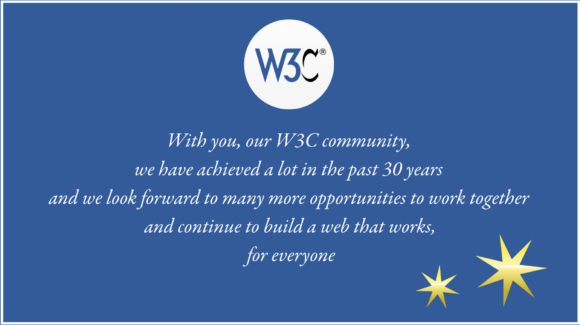As the year 2024 comes to an end, the Web Consortium presents our 30th anniversary year holiday card (click the still image for the animation) to once more express our gratitude:
“With you, our W3C community, we have achieved a lot in the past 30 years and we look forward to many more opportunities to work together and continue to build a web that works, for everyone”
Our card is available in the following languages, thanks to W3C Chapters and our Team:

It has been nearly two years since W3C re-launched as a public-interest non-profit organization, and almost a year since I joined as CEO and President. As I pause to reflect, I wanted to share some of W3C’s notable highlights from 2024. As you’ll see, we demonstrated a lot of the “what” of W3C in really important ways, but the “who" was also a big focus as well as “for whom”.
W3C 30th anniversary
On the occasion of our 30th anniversary, we released a short animation (clip with audio description) with select milestones for W3C and the Internet between 1989-2024. At W3C@30 we celebrated three decades of W3C and of advances in the web, by lining up a few speakers who shared stories about the incredible impact of W3C standards on themselves or the world, and enjoyed ourselves during an authentic evening that culminated with a gala that was nice and cozy (as much as can be for several hundreds people). Photos are available.
Expanding the W3C Team
2024 was a big year as far as increasing the capability of the W3C Team. The W3C Staff has remained consistently relatively small over the years but this year we hired 10 new persons and managed to fill a number of important roles, and to create new positions that are in line with the work we need to be doing for a web that better serves humanity.
- Ken Troshinsky (USA), hired in February as Chief Financial Officer
- Simone Onofri (Spain), hired in February as Security Lead
- Ken Franqueiro (USA), hired in May as accessibility technical specialist
- Tamsin Ewing (New Zealand), hired in July as accessibility content specialist
- Tara Whalen (Portugal), hired in July as Privacy Lead
- Emma Fraser (USA), hired in July as Board enablement specialist
- Tzviya Siegman (USA), hired in September to spearhead our work in Sustainability, and to handle Member relations in North America
- Sylvia Cadena (Australia), hired in September as Chief Development Officer
- Christine Gefaell (USA), hired in October as Director of Legal & Compliance
- Catrina Ahlbach (USA), hired in November as manager of the Office of the CEO
I am proud in particular that we welcomed so many women to the Team this year and that we expanded even more the geographic and cultural diversity of our global Team.
Today the W3C Team operates primarily remotely and includes engineers and experts who work from 11 countries and across 12 time zones (Pacific/Auckland, Australia/Brisbane, Asia/Tokyo, Asia/Shanghai, Indian/Reunion, Europe/Athens, Europe/Madrid+Paris+Lisbon, Europe/London, America/New York, America/Chicago, America/Denver, America/Vancouver).
Principles and goals for the web
2024 was a year where W3C began to surface more of our guiding principles and goals for the web, with emphasis on the human impact of our work.
- Just last week we published as our first ever W3C Statement the Ethical Web Principles which are as much a guide in ethical thinking for our work in the W3C community as they are across the web industry.
- The document Vision for W3C articulates W3C’s mission, what it does and why that matters, and the values and principles by which it operates and makes decisions.
- W3C Team Member Dominique Hazaël-Massieux published a white paper on managing the impact of AI & Machine Learning on the Web (blog)
- W3C Team Member Simone Onofri wrote a white paper on the societal, ethical, and technical impacts of digital identities (blog)
- W3C Members chartered the Sustainable Web Interest Group with a goal to improve digital sustainability so that the Web works better for all people and the planet.
Philanthropic external funding
Further underscoring the importance of our impact on humanity, W3C was the recipient of a major grant from the Ford Foundation “as an investment in a more inclusive future.” This funding will go towards development of web accessibility standards, guidelines, and implementation resources to support access for people with disabilities.
Not only will this strengthen the foundations for our work in accessibility to continue and thrive in the long term, but it is also a boost to our development efforts as this is the first grant that we received since becoming a US public-interest non-profit organization.
Vitality of the Consortium
Finally, I want to share the following 2024 key figures:
- 493 specifications are being actively developed, of which 284 are on the W3C Recommendation track (dashboard)
- W3C has 46 open working groups and 11 open interest groups
- To date, 1,955 Technical Reports have been published since 1 January 2024. Of those, 29 reached the status of W3C Recommendation, or, in other words became web standards. The first number is so big because about 1,800 of them were published as “draft”
All in all, we’ve accomplished a lot together in 2024. At the same time we have laid the groundwork to face some of the challenges in front of us as we move into the new year and to create an even bigger impact on the world.